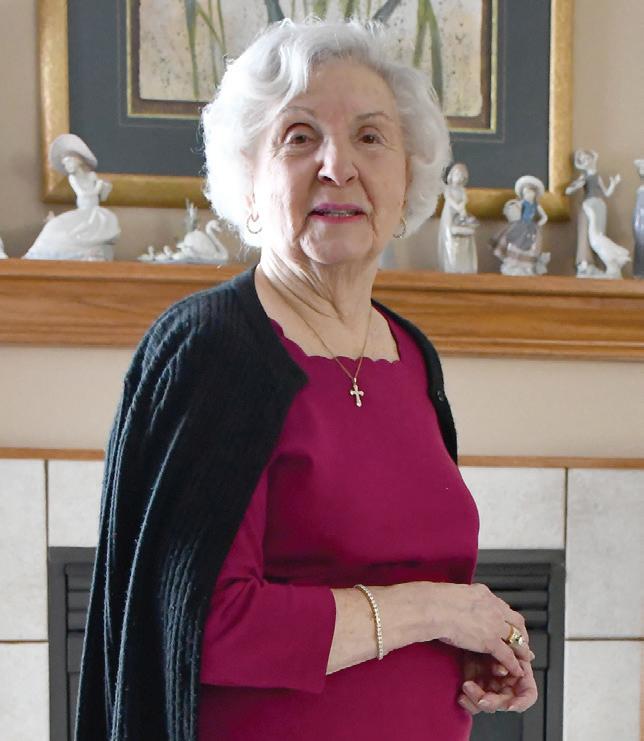
5 minute read
Estate Planning
Take care when leaving assets to grandchildren
Estate Planning
Advertisement
BY DERA L. JOHNSEN-TRACY
Often, grandparents wish to set aside a certain amount or a certain percentage of their estate specifically for their grandchildren. There are several options available to accomplish this objective, and each has its own advantages and disadvantages. Those include 529 college savings plans, direct beneficiaries and trusts, either within your will or within a living trust. Regardless of which option you choose, it is important to make sure that all the pieces to your estate planning puzzle, including ownership and beneficiary designations for each of your assets, fit together to ensure a smooth transition upon your death. 529 plans
A 529 college savings plan can be beneficial from an income tax standpoint. You can remain the owner of the plan during your lifetime while designating a specific grandchild as the beneficiary of each account. Keep in mind, however, that the funds are only available (without penalty) for approved educational expenses and might not include tuition for nontraditional educational institutions, such as cosmetology colleges. If you choose this option, be sure to designate a successor owner on the account upon your death. Direct beneficiary
If you name a grandchild as the direct beneficiary of a life insurance policy or deposit account, this option will provide him or her with an outright distribution of cash upon your death (assuming your grandchild is over 18). This option will not allow you to determine how your grandchild can use the cash. If your grandchild is a minor, this option is not a good solution because naming minors as direct beneficiaries will create the need for a guardianship proceeding in court upon your death. Trust within a will
Within your will, you can create testamentary trusts for your grandchildren in which you designate the trustee of each trust, at what age your grandchild can receive an outright distribution and what the assets can and cannot be used for in the meantime. If you are relying on a will to transfer your assets upon your death, your estate likely will be subject to a probate proceeding in court. Only those assets that are titled solely in your name, with no designated beneficiaries, will be part of your probate estate. Assets with co-owners or designating direct beneficiaries will be distributed outside of your will and not to any trust established within your will. Trusts within a living trust
Within a fully-funded Living Trust, you can create trusts for your grandchildren and ensure these trusts are funded upon your death immediately, privately, and without the need for a costly and lengthy probate proceeding. Through a comprehensive estate plan, you can even create incentives for your grandchildren. For example, you can direct that the assets in your grandchild’s trust are only available for his or her post-high school education until the age of 30 or until he or she obtains a bachelor’s degree, whichever event occurs first.
Attorney Dera L. Johnsen-Tracy is a shareholder and co-founder of Horn & Johnsen SC, a Madison law firm dedicated to estate planning, business law, and real estate.
How seniors can approach exercise
Exercise is a vital component of a healthy lifestyle. By making exercise part of their day-to-day routines, people of all ages, including men and women over the age of 65, can greatly improve their overall health. The American Academy of Family Physicians notes that seniors should aspire to be as active as possible. Exercise is a great way to incorporate physical activity into your daily routine and has been linked to reduced risk for diseases such as heart disease, diabetes and osteoporosis. Though adults with chronic illnesses may be hesitant to exercise, the AAFP notes that it’s possible for men and women who have been diagnosed with such conditions to exercise safely. In fact, the Centers for Disease Control and Prevention notes that regular physical activity is one of the most important things seniors can do for their health and can potentially prevent many health problems associated with aging. Frequency of exercise
Seniors, particularly those who have not exercised much in the past, may not know how much exercise they need to reap the full rewards of physical activity. Though it’s best to discuss exercise with a physician prior to beginning a new regimen, various public health agencies advise seniors to get at least 2.5 hours of moderate aerobic exercise each week. Brisk walking is one example of moderate aerobic exercise. Seniors who want to sweat a little more when exercising can replace moderate aerobic exercise with one hour and 15 minutes of vigorous exercise, such as jogging, each week. Is strength training safe for seniors?

The CDC advises seniors to incorporate muscle-strengthening activities into their weekly fitness routines twice per week. Lifting waits, working with resistance bands, heavy gardening, and even some forms of yoga qualify as muscle-strengthening activities. Exercises that use your body weight for resistance, such as sit-ups and push-ups, also can help build strength. Always speak with a physician before beginning a muscle-strengthening exercise regimen and, if possible, work with a personal trainer, especially if you’re a novice. When to stop a workout
It’s imperative that seniors recognize when to stop working out. Exercising more than is recommended by your doctor can increase the risk of illness or injury. In addition, stop exercising if any of the following symptoms appear: Dizziness or shortness of breath Chest pain or pressure Swollen joints Nausea Tightness in muscles or joints Pain anywhere in the body Throbbing or burning sensations Exercise can help seniors stay healthy and feel more energetic throughout the day. Before beginning a new regimen, seniors should discuss physical activity with their physicians.
mcg.metrocreativeconnection.com
WHITCOMB SQUAREAPTS. (55+) (West) Madison, WI.
NEW! Duplex &SingleFamily Home 4903, 4905 and 4907 Whitcomb Dr. 2BR, 2BA, AttachedGarage. Available starting MarchorApril.


2BRSeniorLivingApts. $1090- $1900 /mo. Incl Garage& Heat. No Pets. 608-227-6543. KellerApartments.com

adno=190371 Areas of Law Practice
Estate Planning / Elder Law • Probate / Guardianship Special needs (Disability) • WisPACT Trust / Real Estate Medicaid/Medicare • Family Law • VA Accredited Social Security Attorneys
Brenda R. Haskins • Julie A. Short Anne M. H. Brindley • Anna M. Dontje Amy Devine • Amanda Pirt Meyer
5113 Monona Drive • Monona, WI 53716 Phone: 608-237-6673 www.HSBElderLaw.com Professional and compassionate legal services
adno=201489
50+ years combined experience!








